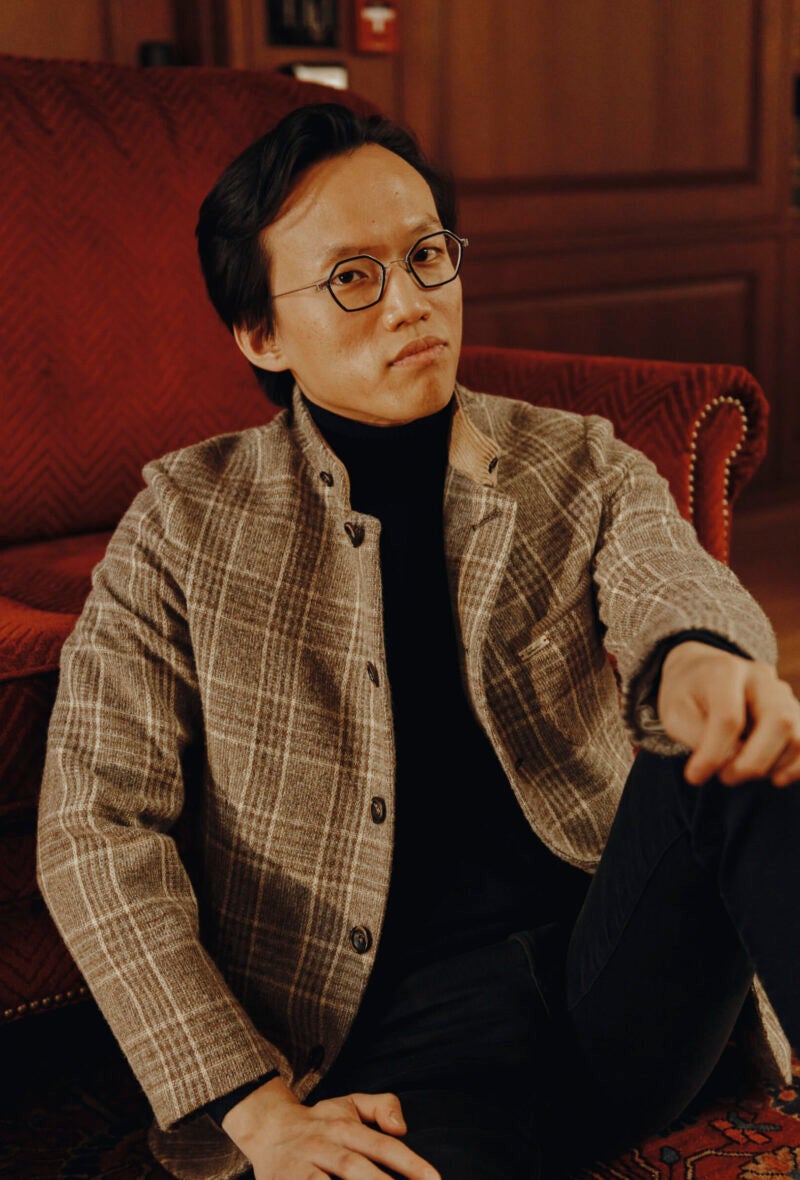Main claim: Debate is an important part of a democratic society.
Reason: It helps us understand one another and ourselves — and, ultimately, encourages the empathy necessary to make decisions together.
Evidence: Bo Seo’s book, “Good Arguments: How Debate Teaches Us to Listen and Be Heard”
In the world of formal debate from which Harvard Law School student Bo Seo ’24 hails, disagreement is not a faux pas, something uncomfortable to suppress or avoid. Instead, it’s the whole point.
By learning the tactics of formal debate and applying them to all kinds of arguments — from political clashes to everyday tiffs — we can practice empathy, build a case, and maybe change a few minds, Seo says. “What I’m trying to do is illuminate the physics that I think underlies our disagreements. Once that becomes clear, we can start the work of disagreeing better, and also harnessing the power of disagreement.”
In “Good Arguments,” Seo, whose family immigrated to Australia from South Korea when he was 8, traces his journey from a quiet kid who shied away from discord to a two-time world champion debater and former coach of the Australian national debating team and the Harvard College Debating Union.
“The project of trying to disagree better, and to make our differences work for us, rather than against us,” he says, “began for me as a work of cultural translation — of moving to a new country where I didn’t speak the language and going through the process of trying to fashion a life around agreement, seeing the limits of that, and then inching toward the possibilities of what disagreement can do.”
Alongside his compelling personal story are Seo’s hard-won lessons on how to better construct, comprehend, and participate in formal — and informal — arguments. “Debate is not the only way in which we should disagree,” he says. “But it’s a toolkit that everyone should have as part of a political and civic education.”
After graduating from Harvard College, where he won the World Universities Debating Championship, Seo earned a master’s degree at Tsinghua University in Beijing, then returned home to work as a political reporter for the Australian Financial Review. He also began thinking about writing a book — one tailor-made for a world awash in hostile and bad-faith arguments.
“Debate reminds us, at a time when the will to quarrel is ascendant, that the skills of argument should carry the day,” says Seo. “We are seeing now the limits of what earnest belief or sincerity alone can do. What we need is for the skill of disagreeing, which we have allowed to atrophy, to make a comeback.”
Many pre-eminent public figures have experience as formal debaters. But one need not be a public figure to understand or benefit from the skills of persuasion, Seo insists — after all, children learn to do it. It starts with approaching an argument with humility. “One thing I love about disagreement is that it requires making yourself vulnerable. It’s appearing in front of another person as yourself — ‘This is what I believe. Now what do you think?’” he says.
“One thing I love about disagreement is that it requires making yourself vulnerable.”
Formal debates often ask participants to take positions with which they disagree, says Seo. By forcing ourselves to consider why our opponents believe what they do, we may construct better arguments of our own. We may even find ourselves agreeing with the other side, he adds. “It shows that empathy is a kind of practice, a series of actions, rather than a trait or a virtue you inherently possess.”
We can learn another lesson from formal debate’s provision of time for all speakers — even those who might normally stay quiet. “Debate reminds us to pay attention to the silences that are in our society, that silence is not always peace,” says Seo. “Simply getting along can sometimes be the enemy of something deeper — intimacy or real understanding. Or even mutual progress.”
And whether a debate solidifies one’s original position or moves one closer to the other side, something important has happened, he says. “Imagine if we viewed conviction as something that emerged out of discussion, as a sort of payoff. It will probably be a bit more equivocal. It will likely have more qualifications. But we should not mistake nuance for weakness.”
Today, as a student at Harvard Law School, Seo once again gets to make arguments. This time, they are necessarily constrained by things like precedents and norms, limitations he appreciates. His goal is “not to be a clever lawyer, [but] to be a good lawyer,” he says. “Part of that means you’re not just coming up with arguments for the sake of it. It requires judgment. In some ways, there’s a consonance with the kinds of arguing that I’ve done before, but I am also having to learn the craft anew.”
Debate is difficult, but it is also worthwhile, argues Seo in his book. It is a way of hearing one another, of working through complicated and sometimes painful ideas together, of finding solutions. “Not every disagreement will be a revelation, but maybe the next one will be,” he says. “And as long as we get into the habit of managing our disagreements — that’s another way of saying ‘managing our differences’ — there is a lot of hope in that.”
